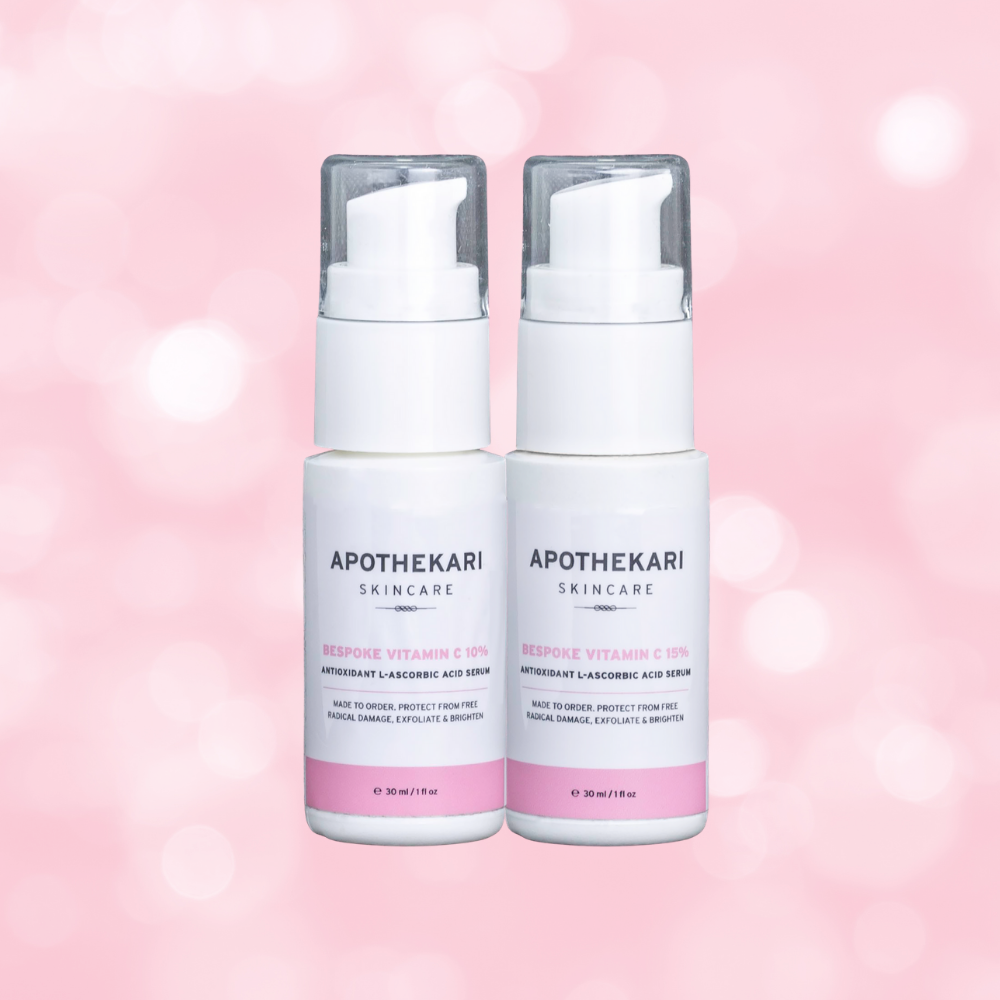Blog
Why Your Skin Needs an Antioxidant Serum
Want to know why most skin care professionals recommend incorporating an antioxidant serum into your daily skin care regimen? This post explains exactly that. Shop Bespoke Vitamin C 15% Shop Bespoke Vitamin C 10% Simply put, an antioxidant is a molecule that inhibits the oxidation of other molecules. Oxidation is a chemical reaction that can produce free radicals, harmful substances that we hear a lot about when it comes to skin. You may have also heard free radicals described as Reactive Oxygen Species – ROS, which is a term used to describe them in living organisms. Free radicals hasten the aging process by contributing to chain reactions that ultimately may damage cells. Because they react with whatever is around, they can attack DNA, proteins and lipids, permanently changing their structure. When it comes to skin, the end result is damage, which we see as fine lines, wrinkles, hyperpigmentation and some types of skin cancer. Because free radicals also trigger inflammation, they have been associated with a breakdown of collagen, which leads to skin sag. Unlike free radicals, antioxidants are stable molecules. They help by donating one of their electrons to a free radical, thereby stopping the chain reaction that causes damage. Fortunately, our bodies manufacture a number of important antioxidants to help combat free radical damage. This includes glutathione and enzymes such as catalase and superoxide dismutase. The recommendation to eat (or in the case of your skin, to apply) antioxidants such as vitamin C, vitamin E and others is to help top up your body’s antioxidant store if too many free radicals are present. There is a lot of research to support the topical application of antioxidants, which have been shown to help protect skin from damage caused by UV rays, pollution and smoke. There isn’t one ‘miracle’ antioxidant and your skin benefits from a mix. The following have good clinical studies to support their efficacy in skin care: Vitamin C. The L-ascorbic acid form is backed by the most science Vitamin E. Works in tandem with Vitamin C to protect skin Ferulic acid. Helps to boost the stability of vitamins C and E Green Tea Polyphenols – Epigallocatechin-3-gallate (EGCG) is thought to have 25-100 times more antioxidant ability as vitamins C and E. Green tea contains other polyphenols (epicatechin, epicathechin-3-gallate, epigallocatechin) with excellent antioxidant activity. Superoxide dismutase and catalase. Enzymes found naturally in our bodies. Resveratrol. Genistein. From soy. Lycopene Coenzyme Q10. This list is by no means exhaustive and as more research becomes available, it’s certain that we’ll discover additional antioxidants that can help skin. Our Bespoke Vitamin C Serum, available in both a 10% and 15% concentration, contains Vitamin C (as L-ascorbic acid), Vitamin E, green tea plus additional antioxidants in a light, hydrating formulation to protect, repair, brighten, exfoliate and more. Which Antioxidant Serum is Right For You? As with any skin care product, your antioxidant serum must be formulated appropriately to ensure that it is stable, can penetrate your skin and contain a high enough concentration to do its job. This is where sticking with a reputable brand makes sense. The following guidelines will help you to find one that works: To get the most bang for your buck, seek out ingredients that deliver more than just antioxidant protection. For example, Vitamin C not only protects against free radical damage, but also brightens skin tone and promotes collagen synthesis at higher concentrations. Opt for a product with a combination of ingredients, which usually performs better than just one single trendy ingredient. Apply antioxidants in the morning prior to UV exposure. UV rays are one of the biggest causes of free radicals. Although this post discusses an antioxidant serum, there is no reason that you can’t swap the serum for a cream or lotion. A serum is just a delivery system for the ingredients inside so if you lean towards cream or lotion formulations, go with that. Do you incorporate an antioxidant into your skin care routine?
Learn moreGreen Tea and Skin: What You Need to Know
The combination of green tea and skin gets a big thumbs up! In fact, I’m such a big fan of its benefits that we have recently added green tea extract to our Bespoke Vitamin C Serums. Shop Bespoke Vitamin C 15% Shop Bespoke Vitamin C 10% Green tea contains a number of beneficial micronutrients including the potent antioxidant Epigallocatechin-3-gallate. Let’s just call it EGCG, shall we? When it comes to green tea and skin, the benefits can’t be downplayed. This valuable ingredient contains polyphenols, nutrients with antioxidant activity, that are also found in dried spices, fruits, vegetables, red wine and cocoa. EGCG is the polyphenol we are most interested in when it comes to skin care because it is backed by the most clinical research to support its health benefits. Although the research is limited, it’s thought that tea (white and green in particular) can increase the antioxidant capacity of tissues, especially the blood, and that it can improve the lipid profile, due to its impact on LDL, or bad cholesterol. Green Tea and Skin Health A number of studies support the skin benefits of green tea, which include: Skin Cancer Protection. Studies suggest that EGCG and other green tea polyphenols are anti-inflammatory and possess anti-cancer properties that may help prevent the growth of skin tumors by reducing sun damage after UV exposure. Acne. By reducing sebum secretion, green tea may help to prevent acne. Rosacea. A small study showed an improvement in redness and capillary involvement in individuals with rosacea although more research is warranted. Wrinkles and Other Signs of Aging. Due to its antioxidant and anti-inflammatory action, topical green tea extract is likely to help slow the development of some signs of aging such as wrinkles and fine lines. If you’re looking to optimize your skin care routine, adding a comprehensive antioxidant formulation is a must. Layer it on in the morning under your sunscreen to help protect against UV damage and pollution. Our Bespoke Vitamin C Serum contains L-ascorbic acid, green tea extract (EGCG) and an arsenal of other highly effective antioxidants to ensure that your skin benefits from this potent combination.
Learn moreVitamin C For Skin: 5 Benefits
Many ingredients can contribute to the health of your skin and I’m really excited about those of Vitamin C for skin. Well studied and well documented, the benefits of the little anti-aging superstar are undisputed! Also known as L-ascorbic acid, Vitamin C is found in a variety of food and used as a dietary supplement. But, it also packs a powerful punch when it comes to skin. If you haven’t considered topical Vitamin C for skin wellness yet, it’s something you may want to think about. Here are 5 proven benefits of topical Vitamin C for skin that will leave you fresh, youthful and glowing: Antioxidant Protection. As an antioxidant, Vitamin C helps to protect skin against damage caused by free radicals, unstable molecules which can wreak havoc to skin cells. Free radicals can be generated upon exposure to ultraviolet (UV) light or pollution. Vitamin C acts as a shield to minimize their disruption. Protection Against Sun Damage. Although not a sunscreen, Vitamin C limits the damage caused by exposure to ultraviolet (UV) light. It does this through its antioxidant activity, by neutralizing free radicals. Although Vitamin C alone can provide photoprotection, it works best in conjunction with Vitamin E, which increases the action of Vitamin C four-fold. Boosts Collagen Synthesis. (Bye Bye Wrinkles!). Vitamin C is essential for the synthesis of collagen, a protein which forms part of the skin’s structural framework. Fights Hyperpigmentation. Vitamin C falls disrupts the synthesis of melanin, which is responsible for skin’s colouring. This makes it a useful agent in treating age spots, melasma and brightening the skin tone. Anti-Inflammatory Agent. Vitamin C has anti-inflammatory activity and can be used in conditions like acne vulgaris and rosacea. It has been shown to promote wound healing and prevent post-inflammatory hyperpigmentation. Shop Bespoke Vitamin C 15% Shop Bespoke Vitamin C 10% Vitamin C treatments are best applied in the morning when they offer protection from daily assaults. If you’re convinced about Vitamin C for skin, we’ve got you covered with Apothekari Bespoke Vitamin C Serum. Available in both a 10% and 15% concentration, we make this treatment to order to ensure its stability and potency. Including ferulic acid, Vitamin E and an arsenal of antioxidants, this light serum delivers unparalleled antioxidant protection. It also boasts hyaluronic acid and glycerin to moisturize and hydrate. What are you waiting for?!
Learn more



